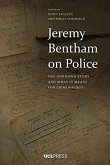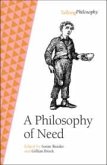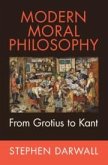Rawls's A Theory of Justice at 50
Herausgeber: Weithman, Paul
Rawls's A Theory of Justice at 50
Herausgeber: Weithman, Paul
- Broschiertes Buch
- Merkliste
- Auf die Merkliste
- Bewerten Bewerten
- Teilen
- Produkt teilen
- Produkterinnerung
- Produkterinnerung
In 1971 John Rawls's A Theory of Justice transformed twentieth-century political philosophy, and it ranks among the most influential works in the history of the subject. This volume marks the 50th anniversary of the book's publication by offering a multi-faceted exploration of this important work.
Andere Kunden interessierten sich auch für
![MacIntyre's After Virtue at 40 MacIntyre's After Virtue at 40]() MacIntyre's After Virtue at 4030,99 €
MacIntyre's After Virtue at 4030,99 €![Jeremy Bentham on Police Jeremy Bentham on Police]() Jeremy Bentham on Police55,99 €
Jeremy Bentham on Police55,99 €![Kripke's Wittgenstein on Rules and Private Language at 40 Kripke's Wittgenstein on Rules and Private Language at 40]() Kripke's Wittgenstein on Rules and Private Language at 4030,99 €
Kripke's Wittgenstein on Rules and Private Language at 4030,99 €![Kuhn's The Structure of Scientific Revolutions at 60 Kuhn's The Structure of Scientific Revolutions at 60]() Kuhn's The Structure of Scientific Revolutions at 6032,99 €
Kuhn's The Structure of Scientific Revolutions at 6032,99 €![Modern Moral Philosophy Modern Moral Philosophy]() Stephen Darwall (Connecticut Yale University)Modern Moral Philosophy32,99 €
Stephen Darwall (Connecticut Yale University)Modern Moral Philosophy32,99 €![A Philosophy of Need A Philosophy of Need]() A Philosophy of Need23,99 €
A Philosophy of Need23,99 €![Modern Moral Philosophy Modern Moral Philosophy]() Stephen Darwall (Connecticut Yale University)Modern Moral Philosophy45,99 €
Stephen Darwall (Connecticut Yale University)Modern Moral Philosophy45,99 €-
-
-
In 1971 John Rawls's A Theory of Justice transformed twentieth-century political philosophy, and it ranks among the most influential works in the history of the subject. This volume marks the 50th anniversary of the book's publication by offering a multi-faceted exploration of this important work.
Produktdetails
- Produktdetails
- Cambridge Philosophical Anniversaries
- Verlag: Cambridge University Press
- Seitenzahl: 391
- Erscheinungstermin: 1. Mai 2025
- Englisch
- Abmessung: 229mm x 152mm x 21mm
- Gewicht: 558g
- ISBN-13: 9781009214667
- ISBN-10: 1009214667
- Artikelnr.: 73431902
- Herstellerkennzeichnung
- Libri GmbH
- Europaallee 1
- 36244 Bad Hersfeld
- gpsr@libri.de
- Cambridge Philosophical Anniversaries
- Verlag: Cambridge University Press
- Seitenzahl: 391
- Erscheinungstermin: 1. Mai 2025
- Englisch
- Abmessung: 229mm x 152mm x 21mm
- Gewicht: 558g
- ISBN-13: 9781009214667
- ISBN-10: 1009214667
- Artikelnr.: 73431902
- Herstellerkennzeichnung
- Libri GmbH
- Europaallee 1
- 36244 Bad Hersfeld
- gpsr@libri.de
Part I. Rawls and History: 1. 'Taillight illumination: how Rawlsian
concepts may improve understanding of Hobbes's political philosophy' S. A.
Lloyd; 2. 'The theory Rawls, the 1844 Marx, and the market' Daniel Brudney;
3. 'Rawls, Lerner, and the tax-and-spend booby trap: what happened to
monetary policy?' Aaron James; 4. 'Rawls's principles of justice as a
transcendence of class warfare' Elizabeth Anderson; 5. 'The significance of
injustice' Peter de Marneffe; Part II. Developments between A Theory of
Justice and Political Liberalism: 6. 'On being a 'self-originating source
of valid claims' Stephen Darwall; 7. ' Moral independence revisited: a note
on the development of Rawls's thought from 1977-1980 and beyond' Samuel
Scheffler; 8. 'The method of insulation: on the development of Rawls's
thought after a theory of justice' Rainer Forst; 9. 'The stability or
fragility of justice' Japa Pallikkathayil; Part III. Rawls, Ideal Theory
and the Persistence of Injustice: 10. 'The circumstances of justice' Erin
I. Kelly; 11. 'Why Rawls's ideal theory leaves the well-ordered society
vulnerable to structural oppression' Henry S. Richardson; 12. 'Race,
reparations, and justice as fairness' Tommie Shelby; 13. ' On the role of
the original position in Rawls's theory: reassessing the 'idealization' and
'fact-sensitivity' critiques' Laura Valentini; Part IV. Pluralism,
Democracy and the Future of Justice as Fairness: 14. 'Public reason at
fifty' Kevin Vallier; 15. 'Reasonable political conceptions and the
well-ordered liberal society' Samuel Freeman; 16. 'Religious pluralism and
social unions' Paul Weithman; 17. 'One Person, at least one vote? Rawls on
political equality...within limits' David Estlund; 18. 'Reflections on
democracy's fragility' Joshua Cohen; 19. 'A society of self-respect' Leif
Wenar; Bibliography; Index.
concepts may improve understanding of Hobbes's political philosophy' S. A.
Lloyd; 2. 'The theory Rawls, the 1844 Marx, and the market' Daniel Brudney;
3. 'Rawls, Lerner, and the tax-and-spend booby trap: what happened to
monetary policy?' Aaron James; 4. 'Rawls's principles of justice as a
transcendence of class warfare' Elizabeth Anderson; 5. 'The significance of
injustice' Peter de Marneffe; Part II. Developments between A Theory of
Justice and Political Liberalism: 6. 'On being a 'self-originating source
of valid claims' Stephen Darwall; 7. ' Moral independence revisited: a note
on the development of Rawls's thought from 1977-1980 and beyond' Samuel
Scheffler; 8. 'The method of insulation: on the development of Rawls's
thought after a theory of justice' Rainer Forst; 9. 'The stability or
fragility of justice' Japa Pallikkathayil; Part III. Rawls, Ideal Theory
and the Persistence of Injustice: 10. 'The circumstances of justice' Erin
I. Kelly; 11. 'Why Rawls's ideal theory leaves the well-ordered society
vulnerable to structural oppression' Henry S. Richardson; 12. 'Race,
reparations, and justice as fairness' Tommie Shelby; 13. ' On the role of
the original position in Rawls's theory: reassessing the 'idealization' and
'fact-sensitivity' critiques' Laura Valentini; Part IV. Pluralism,
Democracy and the Future of Justice as Fairness: 14. 'Public reason at
fifty' Kevin Vallier; 15. 'Reasonable political conceptions and the
well-ordered liberal society' Samuel Freeman; 16. 'Religious pluralism and
social unions' Paul Weithman; 17. 'One Person, at least one vote? Rawls on
political equality...within limits' David Estlund; 18. 'Reflections on
democracy's fragility' Joshua Cohen; 19. 'A society of self-respect' Leif
Wenar; Bibliography; Index.
Part I. Rawls and History: 1. 'Taillight illumination: how Rawlsian
concepts may improve understanding of Hobbes's political philosophy' S. A.
Lloyd; 2. 'The theory Rawls, the 1844 Marx, and the market' Daniel Brudney;
3. 'Rawls, Lerner, and the tax-and-spend booby trap: what happened to
monetary policy?' Aaron James; 4. 'Rawls's principles of justice as a
transcendence of class warfare' Elizabeth Anderson; 5. 'The significance of
injustice' Peter de Marneffe; Part II. Developments between A Theory of
Justice and Political Liberalism: 6. 'On being a 'self-originating source
of valid claims' Stephen Darwall; 7. ' Moral independence revisited: a note
on the development of Rawls's thought from 1977-1980 and beyond' Samuel
Scheffler; 8. 'The method of insulation: on the development of Rawls's
thought after a theory of justice' Rainer Forst; 9. 'The stability or
fragility of justice' Japa Pallikkathayil; Part III. Rawls, Ideal Theory
and the Persistence of Injustice: 10. 'The circumstances of justice' Erin
I. Kelly; 11. 'Why Rawls's ideal theory leaves the well-ordered society
vulnerable to structural oppression' Henry S. Richardson; 12. 'Race,
reparations, and justice as fairness' Tommie Shelby; 13. ' On the role of
the original position in Rawls's theory: reassessing the 'idealization' and
'fact-sensitivity' critiques' Laura Valentini; Part IV. Pluralism,
Democracy and the Future of Justice as Fairness: 14. 'Public reason at
fifty' Kevin Vallier; 15. 'Reasonable political conceptions and the
well-ordered liberal society' Samuel Freeman; 16. 'Religious pluralism and
social unions' Paul Weithman; 17. 'One Person, at least one vote? Rawls on
political equality...within limits' David Estlund; 18. 'Reflections on
democracy's fragility' Joshua Cohen; 19. 'A society of self-respect' Leif
Wenar; Bibliography; Index.
concepts may improve understanding of Hobbes's political philosophy' S. A.
Lloyd; 2. 'The theory Rawls, the 1844 Marx, and the market' Daniel Brudney;
3. 'Rawls, Lerner, and the tax-and-spend booby trap: what happened to
monetary policy?' Aaron James; 4. 'Rawls's principles of justice as a
transcendence of class warfare' Elizabeth Anderson; 5. 'The significance of
injustice' Peter de Marneffe; Part II. Developments between A Theory of
Justice and Political Liberalism: 6. 'On being a 'self-originating source
of valid claims' Stephen Darwall; 7. ' Moral independence revisited: a note
on the development of Rawls's thought from 1977-1980 and beyond' Samuel
Scheffler; 8. 'The method of insulation: on the development of Rawls's
thought after a theory of justice' Rainer Forst; 9. 'The stability or
fragility of justice' Japa Pallikkathayil; Part III. Rawls, Ideal Theory
and the Persistence of Injustice: 10. 'The circumstances of justice' Erin
I. Kelly; 11. 'Why Rawls's ideal theory leaves the well-ordered society
vulnerable to structural oppression' Henry S. Richardson; 12. 'Race,
reparations, and justice as fairness' Tommie Shelby; 13. ' On the role of
the original position in Rawls's theory: reassessing the 'idealization' and
'fact-sensitivity' critiques' Laura Valentini; Part IV. Pluralism,
Democracy and the Future of Justice as Fairness: 14. 'Public reason at
fifty' Kevin Vallier; 15. 'Reasonable political conceptions and the
well-ordered liberal society' Samuel Freeman; 16. 'Religious pluralism and
social unions' Paul Weithman; 17. 'One Person, at least one vote? Rawls on
political equality...within limits' David Estlund; 18. 'Reflections on
democracy's fragility' Joshua Cohen; 19. 'A society of self-respect' Leif
Wenar; Bibliography; Index.









